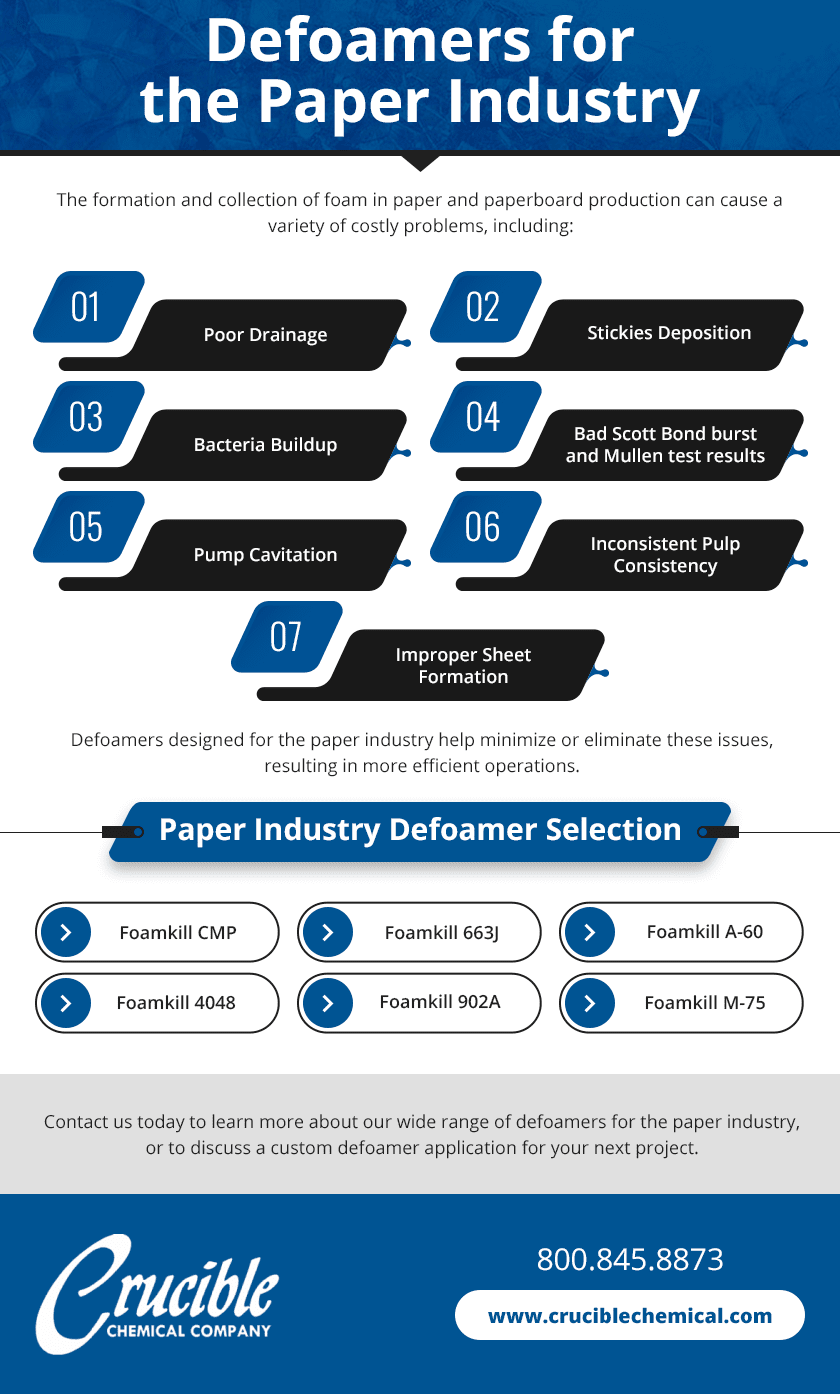How Defoamers Improve Product Quality and Reduce Waste in Production
Discover the Top Advantages of Using Defoamers in Industrial Processes
The usage of defoamers in industrial processes provides a variety of engaging advantages that can enhance functional performance and item top quality. By effectively regulating foam manufacturing, these agents not just optimize product flow however additionally contribute to substantial price reductions and boosted sustainability. Their application spans numerous fields, which questions about their function in mitigating ecological influence while making certain consistent output. Comprehending these advantages is essential for sectors intending to fine-tune their procedures. The ramifications of embracing defoamers might be a lot more extensive than initially viewed. What certain benefits could your organization harness?
Boosted Refine Efficiency
Enhancing commercial processes usually includes resolving foaming issues, which can hinder functional efficiency. Foam formation can disrupt the appropriate functioning of devices, lower the reliable use of resources, and complicate the tracking of crucial parameters. By implementing defoamers, industries can efficiently reduce these issues, leading to structured operations and improved efficiency.
Defoamers job by destabilizing the foam structure, enabling fast collapse and considerable reduction in foam volume. This action not only boosts the circulation of products through devices, such as mixers, reactors, and pipes, however also lessens disruptions triggered by foam overflow. Devices downtime is lowered, permitting for an extra continuous and effective production process.
Furthermore, using defoamers can bring about lowered energy intake. With much less foam to handle, compressors and pumps can operate more efficiently, resulting in reduced operational costs and a general enhancement in process throughput. Ultimately, the strategic use defoamers not only addresses instant frothing difficulties yet also adds to a much more efficient commercial community, cultivating an affordable benefit in a demanding market.
Improved Item High Quality
The assimilation of defoamers in industrial procedures plays a crucial role in enhancing item quality. By effectively managing foam formation, defoamers add to the consistency and uniformity of final products. Excessive foam can result in aeration, which adversely influences the texture and security of formulations, particularly in sectors such as food and drinks, pharmaceuticals, and finishes.

Moreover, defoamers facilitate much better blending and dispersion of active ingredients, resulting in homogeneity in solutions. This is essential in applications where specific active ingredient ratios are crucial for performance and safety and security. Additionally, the elimination of foam can decrease the danger of contamination throughout manufacturing, additional guarding product honesty.
Eventually, by enhancing product quality, defoamers not only boost consumer contentment however also enhance brand credibility. Their duty in maintaining top notch standards highlights their significance in modern commercial processes.
Expense Decrease Advantages
Carrying out defoamers in commercial procedures can lead to significant cost reduction benefits. By effectively controlling foam development, defoamers reduce product loss throughout production, thereby maximizing material use. This reduction in waste converts straight into reduced resources costs, improving total operational efficiency.
Additionally, making use of defoamers can lower power intake. Too much foam can impede tools performance, bring about raised power requirements to maintain blog here production levels. By alleviating foam, defoamers promote smoother procedures, permitting equipment to run extra efficiently and reducing energy expenditures.

Additionally, defoamers can reduce processing times. By utilizing defoamers, industries can improve their processes, leading to faster turnaround times and enhanced throughput.

Environmental Effect Mitigation
In industrial processes, the usage of defoamers plays a crucial role in mitigating environmental effects associated with foam generation. Foam can lead to significant functional inadequacies, leading to increased exhausts and waste generation. By successfully controlling foam, defoamers help keep process efficiency, therefore minimizing the general ecological impact of procedures.
Furthermore, too much foam can overflow control systems, resulting in spills that may infect soil and water sources. Defoamers assist reduce this risk by making certain that lathering does not exceed suggested limitations, promoting conformity with environmental laws. This positive approach not just safeguards environments however also boosts the sustainability of commercial methods.
Additionally, the use of defoamers can decrease energy intake in different processes. defoamers. Lowering foam development diminishes the demand for added energy-intensive steps, such as enhanced agitation or pumping, which may or else be needed to manage foam. The fostering of defoamers straightens with broader sustainability goals by promoting power performance while reducing the carbon impact of commercial activities.
Inevitably, incorporating defoamers right into industrial operations is a calculated procedure that sustains ecological stewardship and accountable resource administration.
Convenience Throughout Industries
Throughout numerous sectors, defoamers show remarkable versatility, adapting to the specific needs of diverse applications. In the food and beverage market, for example, defoamers are critical to maintaining product top quality by preventing foam formation during processing, which can impact structure and flavor. In the pharmaceutical sector, defoamers ensure the stability of formulations, enhancing item efficacy and uniformity.
In the chemical manufacturing world, defoamers facilitate smoother operations by decreasing foam in response vessels, hence boosting yield and reducing downtime. The paper and pulp industry counts on her comment is here defoamers to improve the performance of pulp handling and paper manufacturing, guaranteeing optimal item stability. Additionally, in wastewater therapy centers, defoamers play a crucial duty in managing her latest blog foam during oygenation procedures, causing enhanced treatment end results.
The convenience of defoamers extends to the oil and gas sector, where they help in handling foam in drilling liquids and production processes. By tailoring formulations to satisfy particular industry needs, defoamers function as vital tools that improve functional efficiency, product top quality, and overall process performance across a wide variety of fields. Their adaptability highlights their worth in modern-day industrial applications.
Conclusion
In verdict, the use of defoamers in industrial processes offers various benefits, including boosted efficiency, enhanced item quality, substantial cost decreases, and favorable environmental effects. The assimilation of defoamers represents a calculated approach to attending to obstacles associated with foam monitoring in different making atmospheres.
Ultimately, the critical use of defoamers not just addresses prompt foaming difficulties yet also contributes to a much more efficient commercial environment, fostering a competitive benefit in a requiring market.
In commercial procedures, the use of defoamers plays a vital function in mitigating ecological impacts connected with foam generation. By effectively controlling foam, defoamers assist maintain process effectiveness, therefore lowering the overall environmental impact of procedures.
In addition, in wastewater treatment facilities, defoamers play an important function in managing foam throughout oygenation procedures, leading to better therapy end results.
